|
|

|
FATHER BROWN VOLUME ONE - THE HAMMER OF GOD WARNING - THIS GUIDE CONTAINS SPOILERS! |
||
Regular CastReverend Father John Brown, SJ - Kenneth MoreRegular CrewFrom The Father Brown Stories by G.K.ChestertonStory Advisor - Michael VoyseyTheme Music - Jack ParnellFilm Cameraman - Tony Mander Film Editor - Mike Nunn [#1], Glen Cardno [#2.4] [#3,5 - uncredited] Producer - Ian Fordyce |
|
||
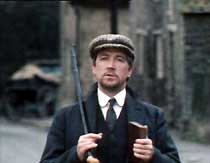
|
Episode 1:The Hammer of GodOriginal TX date: 26/9/74 Adapted by Hugh Leonard Designer - Richard Lake Director - Robert Tronson Note: Father Brown is set in the 1920s. The eccentric Colonel James Bohun and Elizabeth Barnes are indulging in an adulterous affair. As the Colonel leaves her house, he is seen by Joe, a simple-minded villager, and Elizabeth's God fearing blacksmith husband, Simeon, who is returning from work. Father Brown, a Catholic priest with "a weakness for puzzles", visits the town, to conduct the yearly mission in nearby Threlford. The formidable Mrs Deveraux is another visitor: she needs a golf club repaired. Father Brown overhears an argument between Deveraux and the Colonel's brother, the Reverend Wilfred Bohun, about the use of her garden for the parish fete. Deveraux cites the Colonel as the reason for her refusal. The landlord of The Crusader explains to Wilfred that his brother has made Deveraux's maid, Molly, pregnant, and warns him that Simeon Barnes may also be gunning for his brother. Wilfred confronts his brother, who is unrepentant, even boastful, when they are joined by the Colonel's wife, Alex. James intends visiting Elizabeth that night, while her husband is in Greenford, attending a meeting. Reverend Bohun gives Father Brown a tour of his church, and its relics. Father Brown takes Elizabeth's confession, and tells her not to see the Colonel again. Later that night the Colonel visits Elizabeth again. The next morning Wilfred is waiting outside the blacksmith's when James leaves, and they argue, before James breaks off, to torment Joe. Shortly afterwards James is found with his head caved in, in the graveyard, with a hammer belonging to the blacksmith beside the body. The villagers gather in the pub, where Doctor Wynn reveals that James was struck by a single, supernaturally-powerful blow, which had shattered Bohun's iron helmet. Also, why would the killer choose a small hammer, when there were far heftier ones at hand? Elizabeth Barnes is being interviewed by the police when her husband returns. He has an alibi, and witnesses who will vouch for him. Nevertheless, he is arrested. Mrs Deveraux is another suspect - she has arms "as thick as oak trees". Maybe Bohun was struck down with her golf club? Reverend Bohun points the finger of blame at Joe, who wouldn't have the reasoning to pick a larger hammer, and may also have had the strength to strike the fatal blow. Father Brown admits that the theory fits the known facts. Father Brown climbs the spire of the church to speak to the Reverend Bohun, telling him that such a view can make a man think he is God. He tells Bohun that he knows that the Reverend killed his brother by dropping the hammer from the spire, as the Colonel passed below: "you let God's thunderbolt fall". Father Brown will not tell the police, however, trusting that Bohun's conscience will make him confess to the crime. The Reverend turns himself in, and Father Brown leaves for Threlford. Additional cast: Colonel James Bohun - Graham Crowden Reverend Wilfred Bohun - William Russell Elizabeth Barnes - Geraldine Moffatt Simeon Barnes - John Forgeham Joe - Alun Armstrong Doctor Wynn - Robert James Inspector Palmer - Roger Hume Mrs James Bohun [Alex] - Anna Steele Gibbs - Peter Hawkins Mallory - Harry Walker Mrs Deveraux - Anna Wing Landlord - Frederick Hall
Notes:
William Russell's film roles include Above Us The Waves (1955), The Great Escape (1963), Superman: The Movie (1979) and Bertrand Tavernier's little-seen La Mort en direct (aka Deathwatch, 1980). Russell also played Ted Sullivan in Coronation Street, in 1992. His character, a sales rep for a sweets manufacturer, married to Rita Fairclough (Barbara Knox), before dying, three months later, from a brain tumour. Other TV roles include Heartbeat (2000), The Black Adder (playing the dying Duke of Winchester, in The Archbishop, 1983), The Professionals (Involvement, 1980), Shoestring (Private Ear, 1979) and Van Der Valk (Accidental, 1977).
Choice film roles include appearances in Karel Reisz's Morgan: An Unsuitable Case For Treatment (1966), Peter Medak's The Ruling Class (1972), Robert Fuest's adaptation of Michael Moorcock's The Final Programme (1973, a.k.a. The Last Days of Man on Earth) and Terry Gilliam's Jabberwocky. Crowden has also appeared in several films directed by Lindsay Anderson: If... (1968), O Lucky Man! (1973) and Britannia Hospital (1982), and in a number of ribald British comedies, including Percy, Up The Chastity Belt and The Missionary (1982). He recently played Annette Crosbie's husband in Calendar Girls. TV roles include parts in Doctor Who (The Horns of Nimon, 1979), The Professionals (Spy Probe, 1982), Star Maidens (1976), Porridge (as the prison doctor in No Way Out, 1975), Catweazle (The Enchanted King, 1971), Callan (as "The Groper" in A Village Called 'G', 1970) and Danger Man (That's Two of Us Sorry, 1965). Perhaps his finest television role, however, is as alcoholic Doctor Jock McCannon in Andrew Davies' A Very Peculiar Practice.
Armstrong's television roles include the 1982 mini-series of The Life and Adventures of Nicholas Nickleby (an adaptation of Trevor Nunn's stage version), Willy Russell's play Our Day Out (1979), and Our Friends in the North (as Austin Donohue, 1996). In 2003 alone he appeared in the inventive police series New Tricks (which co-starred Dennis Waterman and James Bolam), as Brenda Blethyn's nightclub-owning husband in Kay Mellor's Between The Sheets, Messiah 2: Vengeance is Mine, and in the TV movie Carrie's War. Other roles include parts in Public Eye (The Fatted Calf, 1975), The Sweeney (Stay Lucky, Eh?, 1975), Porridge (A Test of Character, 1977), Enemy at the Door (playing black marketeer in Officers of the Law, 1978). He also featured in three episodes of the popular American sitcom Married... With Children, which found the Bundy family visiting the UK (1992). In 2001 Armstrong was nominated for the Royal Television Society's Best Actor award, for his role in the BAFTA-nominated mini series This is Personal: The Hunt for the Yorkshire Ripper (Alun played Assistant Chief Constable George Oldfield). The Hammer of God is a story in the first collection of Father Brown stories, 1911's The Innocence of Father Brown. |
||

|
Episode 2: The Oracle of the Dog Original TX date: 3/10/74 Adapted by Peter Wildeblood Designer - Michael Eve Director - Peter Jefferies A drunken Donald Druce arrives at Cranston Grange at 3am, waking his father, the Colonel. Father Brown is the Colonel's house guest (he is researching history in the Colonel's library). Father Brown's researches are disturbed by the Colonel's secretary, an American, Patrick Floyd, who is arranging a family luncheon. The Colonel has refused Donald's request for a loan. His daughter, Janet, is involved with a French doctor, Henri Valentine, a relationship that does not meet with the Colonel's approval. The Colonel's nephew, Harry, is a former policeman who has recently returned from service in Bombay, following some unrest with the local natives. Floyd and Doctor Valentine are witnesses to the Colonel's new will. Father Brown knows Doctor Valentine by another, more "distinguished", name (The Marquis de Villon). Floyd claims that Valentine's use of a pseudonym will invalidate the Colonel's will, and brings it to the Colonel's attention. Later Floyd hears Janet and Valentine discussing a murder. Floyd also overhears Donald telling Harry that he suspects that he (Donald) has have been excluded from the Colonel's new will. Janet discovers her father, dead, in the Summer house. He's been stabbed in the back with some kind of narrow blade. The family assemble in the drawing room, airing their various alibis and probing each other's motives. Inspector Cole questions the Colonel's solicitor, Traill, the last person to have been with the Colonel, and notes his "interesting" tie pin. The police also quiz Floyd, who was pruning the hedges with shears. Donald realises that the Colonel's dog howled at the precise moment his master was killed, and then barked at Traill accusingly. Father Brown dismisses their theory: "...and the moon might be made of stilton". Janet admits that she knew that she was the sole beneficiary of the Colonel's new will, but she says that she would have given it all to Donald. A throwaway remark sparks Father Brown's imagination, and he asks Janet, who is wearing white clothes, as her father was, to go to the Summer house, and sit where her father had been sitting. Father Brown ponders the Colonel's fine collection of walking sticks. They walk along the hedge that backs on to the Summer house, and Father Brown demonstrates that someone wearing white could be seen through the hedge and the latticework, and would have been a sitting target. Father Brown suspects Harry. He throws the Colonel's ebony stick into the lake, for the dog to retrieve. It sinks, and the dog returns, howling. Father Brown explains that that's how Harry disposed of the murder weapon: a sword stick. Harry commits suicide with a shotgun before he can be brought to justice. Additional cast: Colonel Arthur Druce - Rupert Davies Donald Druce - Guy Slater Harry Druce - Richard Heffer Patrick Floyd - Bob Sherman Janet Druce - Mel Martin Doctor Henri Valentine - Gerard Paquis Aubrey Traill (The Colonel's Solicitor) - John Atkinson Inspector Cole - Edward Evans Police Constable - Michael Stock Nox - Ben (Trained by John and Mary Holmes)
Notes: The dog's name is Nox, which is Latin for night. Father Brown makes a reference to his absent associate, Flambeaux The Oracle of the Dog is adapted from the third of Chesterton's collections of Father Brown stories, The Incredulity of Father Brown. John and Mary Holmes provided trained animals for numerous TV productions in the sixties, including Doctor Who and Z-Cars.
His other notable roles include appearances in the original BBC version of Quatermass II (1955), The Champions (Project Zero, 1969), Man in a Suitcase (The Man Who Stood Still, 1967), Danger Man (The Actor, 1961) and H.G. Wells' The Invisible Man (The Locked Room, 1959). Towards the end of his career he appeared in several less prestigious productions. He played a vampire-hunting priest in Hammer's Dracula Has Risen From The Grave (1968), was in Michael Reeves' Witchfinder General alongside Vincent Price, and appeared with horror genre icons Christopher Lee, Boris Karloff, Michael Gough and Barbara Steele in the kitsch Curse of the Crimson Altar (1968). He also added gravitas to a couple of films shot in mainland Europe for producer Harry Allan Towers (The Brides of Fu Manchu in 1966, and Five Golden Dragons, in 1967). In the Harry Allan Towers films he was essentially reprising his Maigret character, as he did in the quirky Swedish thriller The Night Visitor. His final film role was in Pete Walker's delightfully squalid Frightmare (1974). He died in 1976, aged 60. With Davies' episodes of Maigret getting very little exposure in the last couple of decades, it seems likely that his most enduring role will, ironically, be one in which he's never seen: he provided the voice for Professor Ian McClaine in Gerry Anderson's 1968 puppet series Joe 90.
His dashing good looks and natural charm landed him a string of prominent film and television appearances during the seventies, including starring roles in Colditz for the BBC (1972, as Captain Tim Downing), and Enemy at the Door, for LWT (1978-1980). He also made notable guest appearances in two episodes of Survivors (as Jimmy Garland in A Beginning and Garland's War, 1975), in Jason King (A Royal Flush, 1971) and in Department S (Spencer Bodily Is Sixty Years Old, 1970). Appearances since then have been more sporadic, but include the 1992 wartime drama Bomber Harris, the Hammer House of Mystery and Suspense TV movie Czech Mate (1984) and the 1998 series Children of the New Forest. |
||
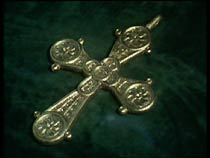
|
Episode 3: The Curse of the Golden Cross Original TX date: 17/10/74 Adapted by Hugh Leonard Designer - Richard Lake Director - Robert Tronson American archaeologist Professor Gerald Smaill is exploring a cave system in Crete. A mysterious voice accuses the Professor of stealing a golden cross, which is on display in a museum in England. The voice warns the Professor that he will soon die. Three months later, on a cruise ship that's just leaving the Bay of Biscay, the Professor confides in Father Brown, who tells Smaill that his life may well be in danger: "There's no man more dangerous than one who thinks he knows the will of God". Smaill shows Father Brown a piece of paper with a fish design: a sign that the killer is on board ship with them. Smaill is returning to England to investigate the discovery of a mummified body in a church crypt, which was apparently found with a gold cross identical to the one the Professor found in Crete. Their fellow passengers, including a travel writer, Leonard Smyth, and an American private detective, Paul Tarrant, have read about the discovery in The Times, rattling Smaill. It seems that the Professor's wife, Helen, is having an affair with the Professor's recently-fired assistant, John Godfrey, who is also onboard. The party arrives in England, where they lodge at the Cliff Edge Hotel, Dulham. They receive an invitation from the vicar, the Reverend John Walters. They are joined by Boon, a Daily Record journalist. The Professor receives a threatening letter, warning him that if he touches the cross he will die. Over dinner the Reverend Walters tells his guests about the excavation, and confirms that there is indeed a golden cross, which is apparently cursed: no-one has yet had the courage to move it. Walters tells them about the history of the cross, which has brought bad luck to everyone that has owned it. The Reverend's guests enter the tomb, except for Tarrant, who decides to stay in the crypt. Smaill examines the corpse, and the cross. As soon as he touches it, there's an accident - the coffin lid slams shut - and Smaill is wounded. Reverend Walters is scared out of his wits, and, demented, throws himself off the edge of the cliff. Father Brown realises that Tarrant is snooping on Godfrey, possibly employed by Godfrey's wife, suspecting his affair with Helen Smaill. Father Brown reveals that Reverend Walters was murdered. He realises there's a flaw in the Reverend's stories about the discovery, however, and visits the tomb, where he finds Walters alive: he concocted the story to lure Smaill into a trap. In fact "Walters" is an impersonator - the real Walters is the body in the tomb - and "Walters" is Smaill's stalker. "Walters" threatens Father Brown, who is rescued by the timely arrival Tarrant. Additional cast: Professor Gerald Smaill - James Maxwell The Rev. John Walters - Peter Copley Lady Diana Wales - Sarah Lawson Leonard Smyth - Geoffrey Chater Helen Smaill - Gwyneth Powell John Godfrey - Peter Penry-Jones Boon - Stanley Lebor Paul Tarrant - Lawrence Trimble Doctor - Hector Ross Landlord - Ronald Mayer Museum Guide - Bella Emberg Notes: The Curse of the Golden Cross was one of the two episodes of the series that were commercially released on VHS. It appeared on Action Classics - Volume 3, an ITC videotape released in March 1994.
He cropped up in many British TV series during the 60s and 70s. His memorable appearances include playing the pragmatic Doctor Bronson in the opening episode of Survivors (The Fourth Horseman, 1975), Doctor Warlock in the Tom Baker Doctor Who story Pyramids of Mars (1975), and two roles in The Avengers (in The White Dwarf, 1963, and All Done With Mirrors, 1968). He also appeared in The Saint (The Sign of the Claw, 1965), Danger Man (Yesterday's Enemies, 1964), three episodes of the BBC science-fiction anthology series Out of the Unknown (Stranger in the Family, 1965, Immortality Inc, 1969 and Taste of Evil, 1971), The Champions (Project Zero, 1969), Doomwatch (Burial at Sea, 1970), Department S (Death on Reflection, 1969), Callan (The Carrier, 1972), Tales of the Unexpected (There's One Born Every Minute, 1981), Hot Metal (Religion of the People) and One Foot in the Grave (The Eternal Quadrangle, 1990). His film roles include the Beatles movie Help! (1965), the Hammer version of Quatermass and the Pit (1967), Hammer's Frankenstein Must Be Destroyed (1969) and Spielberg's Empire of the Sun (1987).
She's also appeared in Public Eye (Unlucky For Some, 1975), The Gentle Touch (as DI Mary Woods in Dany in 1982 and The Conference, in 1984), and as Kitty Rayford in three consecutive 1997 episodes of A Touch of Frost (Penny For The Guy, House Calls and True Confessions). The Curse of the Golden Cross is a story in Chesterton's 1926 collection of Father Brown stories, The Incredulity of Father Brown. |
||

|
Episode 4: The Eye of Apollo Original TX date: 17/10/74 Adapted by Hugh Leonard Designer - Michael Eve Director - Peter Jefferies Father Brown's friend Hercule Flambeau has just moved into a brand new office, in the same American-style building as a secretarial agency run by sisters Pauline and Joan Stacey. Flambeau is visited by Father Brown. As they leave they encounter another tenant, the charismatic be-robed pagan sun worshipper, Kalon, a self-styled "priest of Apollo". Flambeau has a client: the Stacey's blind aunt, Miss Ammerley, accompanied by her aide, Thurston. She tells Flambeau that she has bequeathed her wealth to the industrious Pauline, but is worried his nieces has fallen under Kalon's influence. She is alarmed to find them under the same roof. Ammerley hires Flambeau to investigate Kalon. Joan's fiancee, Gerald Lloyd, pleads with Pauline for money to invest in his plan to make a new kind of radio valves. Flambeau has discovered Kalon's real name - Arthur Stapleton - a con-man who recently served in prison, a fact he admits to Pauline over dinner. Father Brown, returning after a three week retreat in the country, visits Kalon, as "one professional to another". As Kalon carries out his daily noon worship a scream rings out. Pauline is found dead at the bottom of the lift shaft. Inspector Corliss, believing the death to be an accident, questions the various tenants, and establishes where everyone was when Pauline died. Only Thurston, who was visiting Flambeau (who was at lunch), is unaccounted for. Father Brown, suspecting murder, directs the Inspector to an un-posted legal document: a new will drawn up by Pauline, and witnessed by Joan and Gerald. Kalon tells the Inspector that he had refused Pauline's money, but had agreed to be the beneficiary of Pauline's will. Ammerley and Thurston arrive to dispute the validity of Pauline's will, claiming that if she did commit suicide, she was not of sound mind. Corliss arrives with the unopened will. Thurston is allowed to read it, but most of the text is unreadable, as if the ink had run out. Unless the will is proved, Joan will inherit her sister's money, a solution that satisfies Ammerley. A chance remark ("In poor Pauline's eyes money was valueless") prompts Father Brown to realise that there are, in fact, two crimes, committed by two criminals. Father Brown, Flambeau Inspector Corliss and Joan visit Kalon. Brown reveals that Pauline's eyesight had failed, and that she was seeking therapy from Kalon's curative preaching. Kalon had persuaded Pauline to write the new will, but Joan, the only other person who knew Pauline's secret, had deliberately given her an empty pen. Knowing that she had written a new will, Kalon had left the lift doors open, hurrying her to join him in bathing in the light of the midday sun. Father Brown explains that he had always suspected Kalon, because he hadn't even paused in his chanting when Pauline screamed. Additional cast: Hercule Flambeau - Dennis Burgess Kalon (Arthur Stapleton) - Ronald Pickup Pauline Stacey - Alison Key Joan Stacey - Emily Richard Miss Ammerley - Rosamund Greenwood Thurston - Dudley Jones Gerald Lloyd - Christopher Good Detective Inspector Corliss - Oliver Ford-Davies Police Constable - Ken Halliwell Notes: Kalon is equally sneery about Father Brown's religious beliefs, calling him Caiphas. I am indebted to Reverend Father J.T. Zuhlsdorf for an explanation: Joseph Caiphas or Caiaphas was High-Priest of the Jews during the time of the Roman procurator Valerius Gratus, the predecessor of Pontius Pilate, about AD 18. He was and removed from that office by the procurator Vitellius after he took charge n AD 36. During this period the famous Annas, father-in-law of Caiaphas (John 18, 13), who had been high-priest from AD 6-15, exercised great influence through his son-in-law Caiaphas over Jewish affairs and in particular at the trial of Jesus. The Eye of Apollo features in the first father Brown collection, The Innocence of Father Brown. The character of Flambeau is an important one in the Father Brown novels, but is very casually introduced in this episode. In this episode he appears to be no more important than any of the other single-episode characters.
He made his television debut in 1964, playing a physician in the Doctor Who story The Reign of Terror, alongside William Hartnell as The Doctor. Since then he's appeared in dozens of series, guesting as well-spoken villains, dodgy politicians, and landed gentry of all descriptions. Memorable appearances include playing Barrymore in the Jeremy Brett version of The Hound of the Baskerviles; Sir Antony Villiers in an outstanding episode of Bergerac, Burnt; and as Richard Browning in Dennis Potter's 1994 Performance play A Message For Posterity. He also provided the voice of Aslan the lion in the BBC's The Chronicles of Narnia trilogy (The Lion The Witch and the Wardrobe, in 1988, and Prince Caspian and the Voyage of the Dawn Treader and The Silver Chair, in 1989). |
||
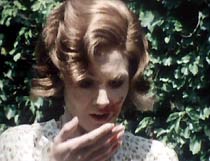
|
Episode 5: The Three Tools of Death Original TX date: 24/10/74 Adapted by Hugh Leonard Designer - Richard Lake Director - Robert Tronson Father Brown has been participating in a BBC radio programme called Straight Talking About the Afterlife, along with a jovial, teetotal Scottish philanthropist, Sir Aaron Armstrong. Father Brown visits Armstrong the next morning, seeking funds for a school for deaf children. As he approaches the house he hears gunshots. Father Brown, the milkman, and Sir Aaron's wife, Lady Armstrong, discover his body in the garden. They are joined by his bloodstained daughter, Alice. A shadowy figure slips quietly away. Fifteen thousand pounds worth of bearer bonds are missing. Brown tells Chief Inspector Gilder that he suspects that Sir Aaron had been bound and thrown from the attic window. Indeed, there are signs of a struggle. Father Brown points out that there are several possible murder weapons at hand, and yet Sir Aaron died from a fall? Father Brown finds six bullets embedded in the floor. Sir Aaron's secretary, Irishman Patrick Royce, and Lady Armstrong join the investigation. Sir Aaron's devoted manservant / bodyguard, Magnus, is curiously absent. Royce tells father Brown how Sir Aaron helped him, when he was a broken-down drunkard. Later, Lady Armstrong tells Father Brown that Royce had cleverly manipulated himself into Sir Aaron's employ, and had become romantically involved with her step-daughter, Alice. Three weeks ago, Royce had asked Sir Aaron for his daughter's hand in marriage, but Sir Aaron had responded by firing him, and telling him to come back in three years' time, in order to test his new-found sobriety and the strength of his character. Royce was a week away from serving out his month's notice. Magnus has submitted himself to police custody, with the bearer bonds. Father Brown demonstrates to Detective Sergeant Merton that it would be impossible to discharge six shots, closely grouped together, if there had been a struggle for control of a gun. Magnus returns to the house, claiming that Lady Armstrong had been unfaithful; Royce wanted Sir Aaron's money; and Alice Armstrong had argued with Sir Aaron about his decision to discharge Royce. He says that he found Alice in the attic with a knife in her hand, when Sir Aaron was killed. Alice admits to being in the room when her father was killed, but denies hating him, and killing him. Royce admits that he killed Sir Aaron, after being discovered, drunk. Alice had cut Royce's hand in the melee, explaining the blood (there were no wounds on Sir Aaron's body). Father Brown reluctantly leaves, with many questions left unanswered. Royce asks to see Father Brown, to offer his confession, in confidence. Royce begins by admitting to "one lie on my conscience". Suddenly Father Brown refuses to hear Royce's confession, realising that Royce is trying to ensure his silence, fearing that he is close to discovering - and revealing - the truth. Father Brown visits Alice. She tells him that she heard Patrick arguing with Sir Aaron, and saw him holding the rope. She grabbed the knife, and cut the rope, injuring Patrick as they struggled, before fainting. She believes Royce killed her father. Father Brown has solved the puzzle: Sir Aaron committed suicide. He had discovered that Lady Armstrong had been unfaithful, and had turned to alcohol, intending to end his life rather than have his public facade of cheerfulness cracked open. Royce had discovered Sir Aaron in the depths of his misery, and had struggled to prevent the old man from killing himself. Alice had interrupted them, severing the rope which Royce had secured around Sir Aaron to prevent him from throwing himself out of the window. Additional cast: Sir Aaron Armstrong - James Hayter Patrick Royce - John Flanagan Chief Inspector Gilder - Anthony Dutton Lady Armstrong - Anne Godley Alice Armstrong - Nina Thomas Magnus - Jacob Witkin Detective Sergeant Merton - David Morton Milkman - Keith James Moderator - Neville Hughes Duty Sergeant - Cyril Cross
Notes: The Three Tools of Death is one of the stories in the first father Brown collection, The Innocence of Father Brown.
In 1959 he appeared with Kenneth More in The Thirty-Nine Steps. Hayter played Mr Memory, and More starred as the dashing Richard Hannay. They'd previously been in two other films together: the 1950 submarine drama Morning Departure, and the 1946 film School for Secrets. Hayter's TV roles included a stint in Are You Being Served (as the bewigged head of the gentlemen's department, Mr Tebbs), and as Captain Webster in The Onedin Line. Guest roles included The Avengers episode A Funny Thing Happened on the Way To The Station, in 1967. He died in 1983.
He's also appeared in two episodes of the ITC series Thriller (The Double Take, in 1975, and Kill Two Birds, in 1976), as well as episodes of Secret Army, Man About The House, and Casualty. He also appeared in a couple of early episodes of The Sweeney, as Detective Sergeant Matthews. |
||



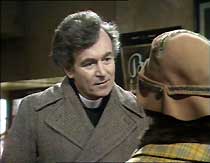

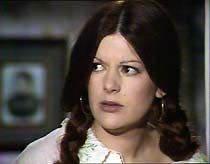

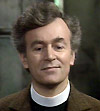 Sunderland-born
William Russell (or Russell William Enoch, as he's more properly known)
starred in several series during the fifties and sixties, most notably in
the title role in Sapphire Films' The Adventures of Sir Lancelot
(1955). He also played schoolteacher Ian Chesterton in the first
seventy-seven episodes of Doctor Who (between 1963 and 1965). An
accomplished stage actor, Russell has been a member of the Royal
Shakespeare Company, the Old Vic and the National Theatre.
Sunderland-born
William Russell (or Russell William Enoch, as he's more properly known)
starred in several series during the fifties and sixties, most notably in
the title role in Sapphire Films' The Adventures of Sir Lancelot
(1955). He also played schoolteacher Ian Chesterton in the first
seventy-seven episodes of Doctor Who (between 1963 and 1965). An
accomplished stage actor, Russell has been a member of the Royal
Shakespeare Company, the Old Vic and the National Theatre.  Edinburgh-born
actor Graham Crowden (who plays the eccentric Colonel Bohun) has been
acting since the 1950s, and has, at one time or other, been a member of
the National Theatre Company at the Old Vic, and the Royal Shakespeare
Company. His film and television roles are usually guest roles that take
advantage of his enormous charisma (and, perhaps not coincidentally, his
6'3" stature).
Edinburgh-born
actor Graham Crowden (who plays the eccentric Colonel Bohun) has been
acting since the 1950s, and has, at one time or other, been a member of
the National Theatre Company at the Old Vic, and the Royal Shakespeare
Company. His film and television roles are usually guest roles that take
advantage of his enormous charisma (and, perhaps not coincidentally, his
6'3" stature).
 Alun
Armstrong (who plays Joe) is probably busier now than at any time since he
began his film and TV career, in the early 1970s. His many notable film
credits include Mike Hodges' Get Carter (1971), Ridley Scott's
The Duellists (1977), Clint Eastwood's White Hunter Black Heart
(1990), Mel Gibson's Braveheart (1995), Tim Burton's Sleepy
Hollow (1999) and Stephen Sommers' The Mummy Returns (2001). He
also played Inspector Teal in the 1997 film version of The Saint,
alongside Val Kilmer.
Alun
Armstrong (who plays Joe) is probably busier now than at any time since he
began his film and TV career, in the early 1970s. His many notable film
credits include Mike Hodges' Get Carter (1971), Ridley Scott's
The Duellists (1977), Clint Eastwood's White Hunter Black Heart
(1990), Mel Gibson's Braveheart (1995), Tim Burton's Sleepy
Hollow (1999) and Stephen Sommers' The Mummy Returns (2001). He
also played Inspector Teal in the 1997 film version of The Saint,
alongside Val Kilmer.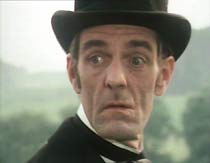


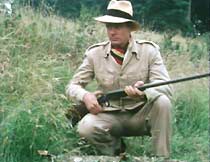
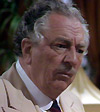 Rupert
Davies was best known to TV viewers in the sixties as the pipe-smoking
French detective Maigret, in the BBC series which aired between
1960 and 1963. It was a role that somewhat typecast the actor, and one he
would return to again in 1969 for a one-off special, Maigret at Bay.
Remarkably all of the series still survives in the BBC archives.
Rupert
Davies was best known to TV viewers in the sixties as the pipe-smoking
French detective Maigret, in the BBC series which aired between
1960 and 1963. It was a role that somewhat typecast the actor, and one he
would return to again in 1969 for a one-off special, Maigret at Bay.
Remarkably all of the series still survives in the BBC archives. 

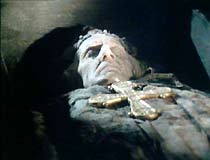
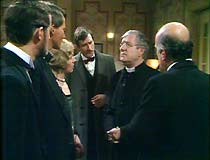
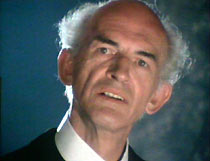
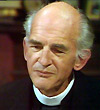 Old
Vic-trained character actor Peter Copley (The Reverend John Walters) was
born in Bushey, Hertfordshire in 1915.
Old
Vic-trained character actor Peter Copley (The Reverend John Walters) was
born in Bushey, Hertfordshire in 1915. 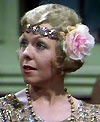 Gwyneth
Powell (who plays Helen Smaill) is known to an entire generation of young
adults as Bridget 'The Midget' McClusky, head teacher of Grange Hill,
between 1981 and 1984. and again between 1986 and 1991.
Gwyneth
Powell (who plays Helen Smaill) is known to an entire generation of young
adults as Bridget 'The Midget' McClusky, head teacher of Grange Hill,
between 1981 and 1984. and again between 1986 and 1991. 
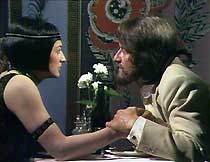
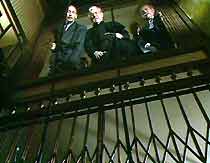
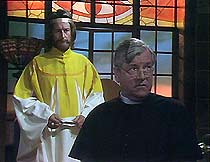
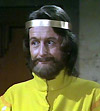 Ronald
Pickup (who plays Kalon) possesses one of the most distinctive voices in
the business, which has no doubt contributed to his a successful career
which now spans five decades.
Ronald
Pickup (who plays Kalon) possesses one of the most distinctive voices in
the business, which has no doubt contributed to his a successful career
which now spans five decades. 
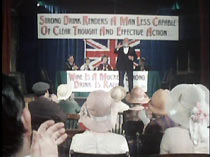
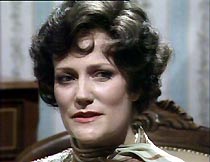
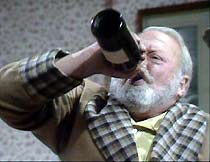
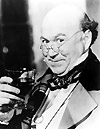 James
Hayter (Sir Aaron Armstrong) enjoyed an impressive career in films between
1936 and 1972, including a leading role in The Pickwick Papers
(1952, as Samuel Pickwick). He also appeared as Ned and Charles Cheeryble
in Alberto Cavalcanti's 1947 version of Nicholas Nickleby, as the
Commissionaire in Passport to Pimlico (1949), and as Friar Tuck in
two Robin Hood movies: Disney's The Story of Robin Hood (1952) and
Hammer's A Challenge For Robin Hood (1967). He also appeared in a
couple of other Hammer films (
James
Hayter (Sir Aaron Armstrong) enjoyed an impressive career in films between
1936 and 1972, including a leading role in The Pickwick Papers
(1952, as Samuel Pickwick). He also appeared as Ned and Charles Cheeryble
in Alberto Cavalcanti's 1947 version of Nicholas Nickleby, as the
Commissionaire in Passport to Pimlico (1949), and as Friar Tuck in
two Robin Hood movies: Disney's The Story of Robin Hood (1952) and
Hammer's A Challenge For Robin Hood (1967). He also appeared in a
couple of other Hammer films ( Actor
John Flanagan (Patrick Royce) is also a successful TV script-writer, with
episodes of Doctor Who, Robin of Sherwood, Heartbeat
and Pie in the Sky to his credit.
Actor
John Flanagan (Patrick Royce) is also a successful TV script-writer, with
episodes of Doctor Who, Robin of Sherwood, Heartbeat
and Pie in the Sky to his credit.